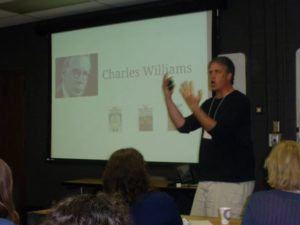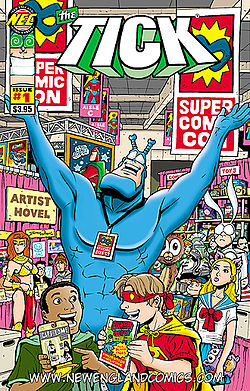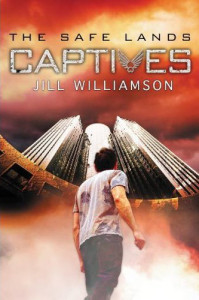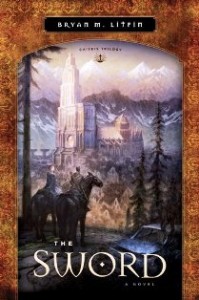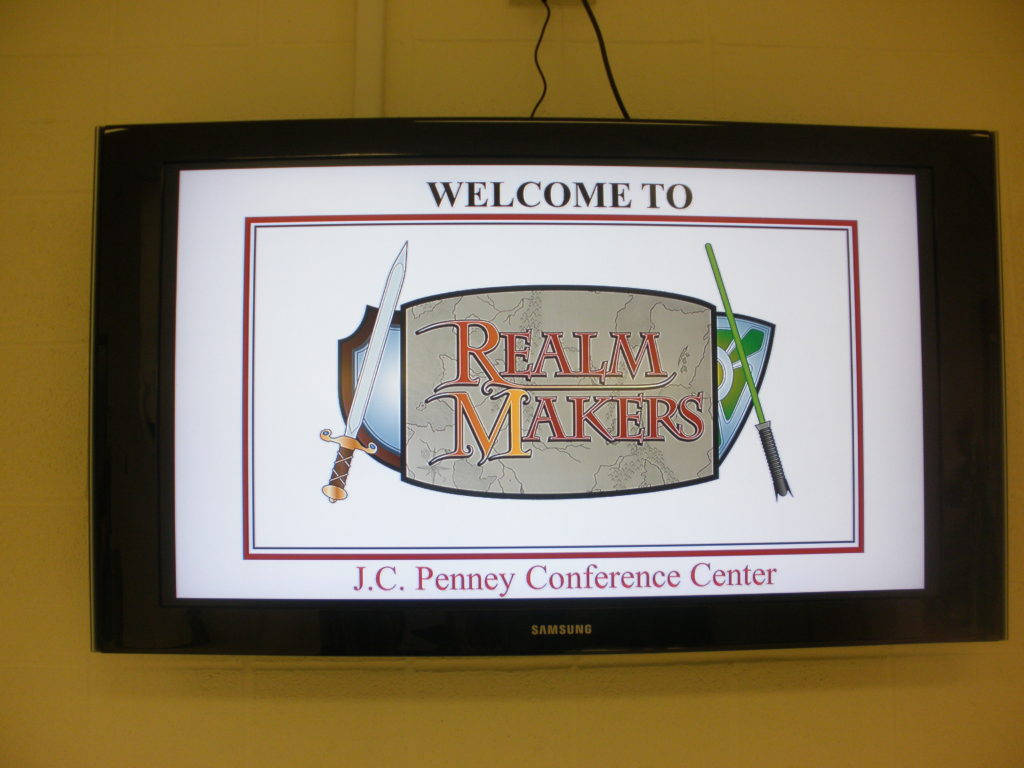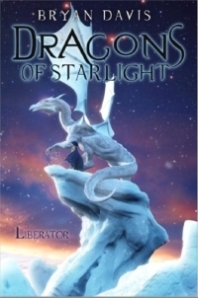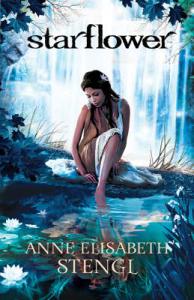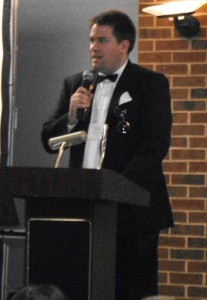
E. Stephen Burnett at Realm Makers 2013.
What if ⊠at a gathering like this, no one ever mentioned the name of C.S. Lewis?
I do believe the world would be âoverturned and perish in fire and water.â
After all, if fans of Christian fantasy, sci-fi, and other speculative stories had a patron saint, it would be C.S. Lewis. And this year would be significant for us. Thatâs because 50 years ago, Lewis himself passed into the real next world, or what he called âAslanâs Country.â
Since then, most readers who love Christian fantasy and science fiction have heard about Lewis. Youâve likely read The Chronicles of Narnia. And many authors are compared to him.
Why is Lewis so successful?
Why do we always name-check him?
Why name the Clive Staples award after the C.S. in his name?
At least three of Godâs gifts motivated Lewisâs success: truth, beauty, and unity.
1. Truth
Many remember that Lewis said he didnât want to preach about Christianity in Narnia.
Instead he had images he decided to use for stories. Images like a faun, a wood, a winter.
Based on that, some say, âSee, C.S. Lewis wasnât trying to preach, and neither should we.â

âWhen they tried to look at Aslanâs face they just caught a glimpse of the golden mane and the great, royal, solemn, overwhelming eyes; and then they found they couldnât look at him and went all trembly.â
Ah, but Lewis was clear that first âAslan came bounding in.â Only after Aslan the Great Lion arrived â not only the character, but His inspiration â was the world of Narnia born.
A scholar of mythology and literature, Lewis was famous long before Narnia because of his nonfiction explorations of doctrinal truth in Mere Christianity and other books. Christ had converted this former atheist. He believed in truth. He believed in mystery, but that Jesus Christ can be known personally, according to what He has decided to tell us in His Story.
Lewis wrote according to Godâs Truth, as best he could. And he never apologized for that.
I might add, he also didnât spend a lot of time insisting he âwasnât preachy.â He just did it.
2. Beauty
Yet there are many different ways to explore Truth in writing.
Lewis didnât stick with writing truth in nonfiction. His early straight fantasy fiction was The Ransom Trilogy (or Space Trilogy or Cosmic Trilogy). Yet sometimes we forget that Lewis moved on from nonfiction to fantasy, which included his later-year Narnia stories.
Narnia and Lewisâs other works are beloved because they explore truth and beauty.
Lewis turns a phrase. He experiments with words. With words as quills, he draws pictures. He delights in nature, adventure, senses, and the fantastical. The best kind of âedginess.â
He wasnât the first. God was. Reading the Bible, we find truth and beauty in many forms.
God didnât inspire only a textbook, a sermon, a systematic theology, a short-story collection, poems, parables, law codes, or histories. Instead He included all of these to share His Story.
 Sometimes we Christians forget that.
Sometimes we Christians forget that.
If we get tired of hearing only of Biblical Doctrine Facts, we may think only stories matter.
If we get tired of hearing only stories, we may think only Biblical Doctrine Facts matter.
But stories without truth are at best shallow. And stories without beauty bring less joy.
âBeautyâ without joyful truth is ugly. âTruthâ without joyful beauty is deceptive.
God enjoys both. Lewis enjoyed both.
So should we. In enjoying both beauty and truth, we honor and worship God.
3. Unity
Lewis unifies Christians. Everyone wants a piece of him.
A friend told me someone argued Lewis would have taken X view on one issue. Speaking in âinternet,â I said, âOh noes! If C.S. Lewis âwould haveâ favored or disfavored a thing, I guess itâs over for Christians who say otherwise! Debate over and done! Everybody go home!â
Sometimes our Lewis-mania gets silly. But there is a reason we all want a piece of Lewis.
He brought Christians together. Not around himself, but around creativity and stories.
Stories that point to truth and beauty. To our Author and Hero.
As lovers of Christian fantasy and science fiction, we need to keep doing the same.
 That means growing. Sharing the stories we love (and the stories we write and publish). Writing reviews and recommending books. Having conferences like this one.
That means growing. Sharing the stories we love (and the stories we write and publish). Writing reviews and recommending books. Having conferences like this one.
And it means promoting unity during our 365.25-ish-days-a-year conference: the internet.
Iâve noticed something (starting with the time I did this). Christian SF readers often do this:
- âHey, why isnât there more Christian sci-fi and fantasy around?â
- âI just found this one rare Christian SF book. Itâs great! Iâll find the author online.â
- âIâm a fan of this author. Iâll buy all his/her books! But there are so few of us.â
- âWow, this genre is so weird! But itâs fun being weird, counter-cultural, niche. Might be fun to keep it that way. Besides, Iâm settled with this author and his/her stories. My pioneer days, of trying to find new and excellent Christian SF stories, are over.â
And then it happens all over again. Some other readers come along and says, âHey, why isnât there more Christian sci-fi and fantasy?â and tries to reinvent their own fantastic fire.
Meanwhile, you and a hundred others sit around the older fire, which could be fading.
I say âfireâ because itâs a Christian conference. At these things, speakers must encourage people to get On Fire for something. But I encourage no such spontaneous combustion.
Instead, just enjoy the stories you read. The stories you write. In this, worship our Author.
And letâs remember: the more worship, the merrier. The more Godâs truth and beauty can spread. The more our Creator can be glorified. And the more fantastic stories weâll find.
About the Award
 How might we find and promote such stories? One way is with an award like the Clive Staples Award for Christian Speculative Fiction.
How might we find and promote such stories? One way is with an award like the Clive Staples Award for Christian Speculative Fiction.
A little backstory. Every fantastical tradition needs that.
- Fantasy writer and freelance editor Rebecca LuElla Miller, a co-founder and regular columnist at Speculative Faith, initiated this award in 2008. In 2009 the inaugural winner was Donita Paul. The following year, Bryan Davis took home the honor. Now after a two-year hiatus, weâve revived the award.
- This yearâs sponsors are SpeculativeFaith.com and Realm Makers. (We welcome additional sponsors!)
- In early April we opened readersâ nominations at SpeculativeFaith.com, for any Christian speculative novel published by a royalty-paying publisher in the year 2012.
- A week later we began exploring the possibility of teaming with Rebecca P. Minor and Realm Makers.
- Then on July 8 at SpeculativeFaith.com, we gathered all the nominations and held the first round of reader votes. To be an eligible participant we asked: Have you read at least two of these titles?
- On July 15 author Robert Treskillard undertook the task of designing the CSA seal. On July 19 we announced the five finalists, in alphabetical order by author, and began the final round of voting.
- Tonight Iâll read excerpts from each of those nominees, in alphabetical order. Then weâll announce the runners-up in reverse order of their finish, and finally the winner. Each nominee will receive a printed certificate. The winner will receive the grand prize.
Liberator â Bryan Davis
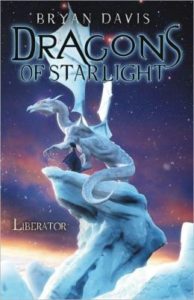 Jason [‘Jay-son] steadied himself on the stone-moversâ raft and scanned the sky from horizon to horizon. Still within the confines of the Southlands, he dipped his steering pole into the river as quietly as possible. Elyssa [Eh-‘lih-suh] had said dragons lurked in the area, and her Divinerâs gift of detecting a presence in the air or hidden in the shadows seemed as sharp as ever. At least one fire-breather was out there . . . somewhere.
Jason [‘Jay-son] steadied himself on the stone-moversâ raft and scanned the sky from horizon to horizon. Still within the confines of the Southlands, he dipped his steering pole into the river as quietly as possible. Elyssa [Eh-‘lih-suh] had said dragons lurked in the area, and her Divinerâs gift of detecting a presence in the air or hidden in the shadows seemed as sharp as ever. At least one fire-breather was out there . . . somewhere.
As he, Elyssa, and Koren [‘Ko-rehn] floated northward on the riverâs slow current, clouds hovered low to the east over the Zodiacâs spires, drifting closer on a freshening breeze. The western view revealed a forest beyond the river-bank â peaceful and quiet. Now late in the day, Solarus [Sohl-‘air-ruhs] had already settled near the treetops. They would have to make camp soon, but definitely not until the dragonsâ village lay well behind them. Although no scaly-winged beasts sailed or shuffled anywhere in sight, sleep would come more easily if they could put some distance between the dragonsâ abode and their intended camping spot.
Jason allowed his gaze to settle on the forest once more. Somewhere in that area Randall [‘Ran-dahll] and Tibalt [‘Tih-bahlt] marched in search of Wallace and the cattle-camp children, meaning the lack of a dragon patrol was good news. Maybe they would find the refugees in time to warn them about the deadly disease spreading through Starlight, a hard-enough task even without dragon interference. Since the disease was so contagious, and since Randall and Tibalt had both been exposed, providing a warning while staying at a safe distance would require more than a little ingenuity.
A Throne of Bones â Vox Day
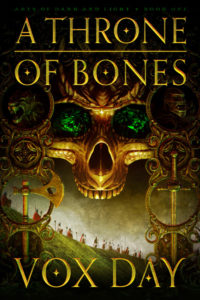 âWho are you?â
âWho are you?â
Ahenobarbus [Ah-‘hee-no-‘bar-buhs] stared at the faded painting in the gilded frame mounted on the wall in front of him. The flickering candles cast an eerie glow upon the scene: Six armed men stood over the fallen body of a seventh man, from whose face Ahenobarbus, or as others reverently called him, His Sanctified Holiness Charity IV, couldnât take his eyes. The victim was nude, and though there were six assassins in the painting, the body bore seven wounds. Someone had struck twice.
âWhy did they kill you?â
The painting was entitled Decessus Inmortuus [Deh-‘chehss-us Ih-‘mor-too-us], âThe Death of the Undying.â It had once been considered a masterpiece. But now it was here, deep underground in the storage vaults. Quintus stood in an insignificant room occasionally used for receptions by minor functionaries deep in the bowels of the sanctal palace. The painting had recently been moved here from the storage areas, but this wasnât exactly an honored location.
The bright colors and the flat, unnatural perspective were typical of the artist: Mariattus [Mar-ee-‘ah-toos], the great Nardine. Only the face of the stabbed man was facing toward the viewer. The six assassins were all in profile. It was almost as if Mariattus had intended to draw particular attention to the face.
Ahenobarbus reached out an arthritic finger and lightly traced the outline of the fallen manâs jaw. âAnd how can it be that you are not dead?â
Mortal â Ted Dekker and Tosca Lee
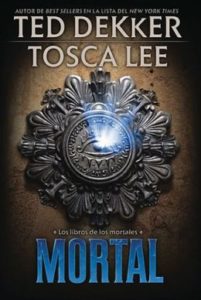 Roland Akara, Prince of the Nomads and second only to Rom Sebastian among all Mortals, sat unflinching upon his mount, scanning the valley below with the eyes of one whoâd seen far too much to be either easily disturbed or easily satisfied. He was a warrior, loved desperately by all who followed him, a leader descended from generations of rulers, a man given to purpose without an ounce of compromise.
Roland Akara, Prince of the Nomads and second only to Rom Sebastian among all Mortals, sat unflinching upon his mount, scanning the valley below with the eyes of one whoâd seen far too much to be either easily disturbed or easily satisfied. He was a warrior, loved desperately by all who followed him, a leader descended from generations of rulers, a man given to purpose without an ounce of compromise.
And that purpose had never been clearer: to usher in the reign of Jonathan at any cost in utter defiance of death.
On the dark stallion next to his own sat his sister Michael, twenty-sevenâyounger than Roland by three years. A composite bow was slung across her back in the same manner as his. The long drape of her coat covered the curved sword that rode her hip. They were two Mortals, clad in black, overlooking their kingdom.
But this was not their kingdom. This was a valley of death. It spread out to the west and east, a vast waste only intermittently broken by a patch of twisting scrub. Whatever had once flowed through this dry riverbed had all but poisoned it. Even now, hundreds of years after the wars that had ruined massive stretches of countrysideâincluding the vineyards that had once characterized this regionâonly the staunchest new growth survived.
Michael spoke in a low voice, jaw tight. âHeâs there.â
Prophet â R. J. Larson
 Tarnished snow sifted through the air, clinging to Ela Roeh [‘El-lah ‘Row-eh]âs skin the instant she stepped outside. Warm snow. Impossible.
Tarnished snow sifted through the air, clinging to Ela Roeh [‘El-lah ‘Row-eh]âs skin the instant she stepped outside. Warm snow. Impossible.
She rubbed at the flakes on her bare forearm and watched them smear across her brown flesh like menacing shadows. Ashes. What was burning?
Unnerved, Ela scanned the plain mud-plastered stone houses honeycombed around the wide public square. Houses built one atop another within a vast, irregular, protective curtain wall, sheltering the city of Parne [‘Parn-ay]. Mud and stone wouldnât burn, but the timbered interiors could. Sheâd seen it happen before, the thick dark smoke suffocating its helpless victims.
No, none of the houses were smoldering. Nor was Parneâs crown, he temple. Good. A blessing.
A gust of wind brushed her face with more ashes. Ela tasted the harsh metallic bitterness and frowned. If none of Parneâs homes were burning, then the ashes were puzzling indeed, because they must have come from a great distance. Parne, Ela remained convinced, was the most isolated city-state in existence. âInfinite . . .â
She stopped. Why pray about ashes without first learning their source? But perhaps she shouldnât wait, especially when those ashes were interfering with little things, like her ability to see and breathe. Really, she needed to cover herself. The ashes were clinging to her like living creatures, scuttling bugs determined to cause misery. Ela shuddered, imagining insects scurrying over her skin. Why hadnât she grabbed her mantle before deciding to take a walk?
Ela stepped back inside her familyâs home, a stark uneven box of a residence, exactly like every other home in Parne. Useful. Basic. Never changing from one generation to the next. Just like Parneâs citizens. She snatched her thin brown mantle and called to her mother, âIâm going up to the wall! Itâs snowing ashes.â
Starflower â Anne Elisabeth Stengl
 The trees drew back from the girl as she fled. They dared not interfere while she walked that Path, no matter how they might wish to. She took no notice of them. how long has she fled now? Had it been one night, or days and weeks of this nightmare? And always the howls pounded her memory.
The trees drew back from the girl as she fled. They dared not interfere while she walked that Path, no matter how they might wish to. She took no notice of them. how long has she fled now? Had it been one night, or days and weeks of this nightmare? And always the howls pounded her memory.
Suddenly, the howls vanished. A new voice spoke from the gloom.
Come to me, pretty maid.
The girl stopped, swaying where she stood, on the verge of collapsing. Slowly, as though she dared not hope to find what she sought, she turned her head to the left. Between the trees a river sparkled like a ribbon of pure light and sweetness.
Her thirst was overwhelming. Even the snarls faded from her mind, replaced by the riverâs voice, babbling, gurgling, inviting. Come to me, pretty maid, it said, though she heard only the voice of water.
Her feet left bloodstains on the moss and rocks as she hastened down to the riverâs edge. A glint of gold shimmered in the tail of her eye, shining even in the Woodâs oppressive shadows. She ignored it. Falling to her knees on the bank of the water, she plunged both hands in. The water stung her wrists where the harsh cords had bitten into her skin.
Drink deeply. Drink.
The water flowed about her arms, fresh and alive, and the sounds of its flowing filled her ears. She cupped her hands and lifted the cooling liquid to her lips. She drank.
Nominees and Winner
5. Mortal â Ted Dekker and Tosca Lee
4. Prophet â R. J. Larson
3. A Throne of Bones â Vox Day
2. Liberator â Bryan Davis
1. Starflower â Anne Elisabeth Stengl
 And this is exactly why Iâm excited about the recent inaugural Realm Makers conference.
And this is exactly why Iâm excited about the recent inaugural Realm Makers conference.